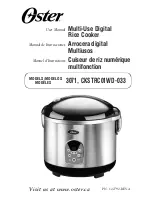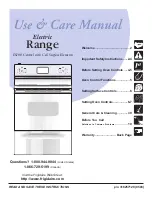
P·17
P·16
3.2 Putting the ingredients in the cooker
• Add at least one glass of water/liquid into the cooker every time you cook. Do not
overfill the pot more than the half. This level is for liquids and ingredients together.
Caution: The cooker can only be filled to the half when cooking food that is effervescent
or foamy (chickpeas, peas, rice etc.). Add a dessertspoonful of butter or oil before
cooking to reduce foaming.
• Maximum filling limit (2/3) is marked on the inside of the cooker. Do not overfill the
pressure cooker above this limit in any circumstances. Otherwise, the valves will be
clogged with food and they cannot function properly.
3.3 Closing the lid
• Cooking valve should be in the steam discharge position. Place the lid on the cooker
while the clamps are open. While pressing down the lid with one hand, press the close
button using your other hand’s thumb.
• Check that the clamps are locked, and are fully intact with the cooker.
3.4 Cooking
• Place the pressure cooker on the stove and turn on the stove to the
highest heat level.
• Be careful that the stove is not bigger than the cooker, and that the heat does not
protrude from the side of the cooker.
• Cooking valve should be in the steam discharge position, meaning that is fully open.
After a while, the steam begins to discharge from the cooking valve with a hissing
sound, first of all, bring the heat to the lowest level.
• Turn the cooking valve according to the type of your meal. After this stage the
cooking is started, keep the time.
• Do not interfere with the cooking valve while cooking. The valve discharges the extra
pressure.
Note: The necessary cooking temperature has been reached when the steam is
discharged through the cooking valve. Cooking times shown in the Cooking Time Table
indicates the time required after the first steam is discharged.
• The simple rule for cooking times while cooking with a pressure cooker is that anything
can be cooked at 1/3 of the normal cooking time required for in a standard cooker.
Example: 10 minutes instead of 30 minutes
3.5 How to open the lid when the meal is cooked
• Turn off the stove after the meal is cooked. The pressure in the cooker will be
minimized during this waiting period. Wait for 3 minutes. Turn the cooking valve slowly
to the steam discharge position and wait for all the steam to be discharged. Keep a safe
distance with the pressure cooker while opening the lid. Do not force the lid.
• If you need to open the lid without waiting 3-4 minutes when you turn off the heat,
place the cooker under cold water for 1 minute. Turn the cooking valve to the of steam
discharge position to let out all the pressure.
ATTENTION: A large amount of steam can be discharged through the cooking valve,
and burn your face or other parts of your body. You can hear a hissing sound to
indicate rapid pressure drop that occurs during “quick opening”. This sound is normal.
The lid can be opened only when all the steam is discharged. Quick pressure drop
mode should not be selected for vegetables, grains or foamy eatables.
4.Cleaning and Maintenance
4.1 Cleaning the pressure cooker’s body
Pressure cooker’s body can be cleaned in a dishwasher or by hand just like other
stainless steel cookers. Please do not use metal brushes, abrasive cleaners or
bleachers because they can be harmful to the surface. Fill the pressure cooker with
lemon juice (mix half a lemon juice with 2 glasses of water) to remove stubborn dirt and
fading. Let the mixture pressure boil for 5 minutes. Remove the pressure cooker from
the stove and let it cool. You can rinse your pressure cooker with hot water now. The lid
should only be cleaned with hot water and detergent. DO NOT WASH THE LID IN A
DISHWASHER. Do not use harsh or abrasive materials to clean.
Attention: Do not wash the lid and the silicone seal in the dishwasher. Put the lid on
the cooker upside down when storing the pressure cooker in a cabinet. The pressure
cooker can only be stored without food in it. It should be clean and dry when stored.
4.2 Cleaning the cooking valve
• Remove the nut under the lid to which the cooking valve is attached, and remove
the valve from the rim.
• Hold the cooking valve with both hands as shown in the
image, and turn the bottom part slightly counterclockwise.
Pull to remove both parts.
• Check both parts. Clean food residue
with a small brush.
Image 1
Image 2
Image 3
Valve nut
Smal gasket
(O-ring)
Valve bottom
part
Valve top part
EN
INSTRUCTIONS FOR USE










































